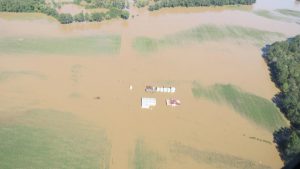Today’s question from the Georgia Climate Project Roadmap discusses the importance of understanding the risks that we are likely to see from extreme weather on urban and rural infrastructure. This could include changes in the frequency or severity of tropical storms, increases in flooding and the impact on roads, manure lagoons, etc. and higher temperatures and how that might affect power production.
30. How will climate change in Georgia create risks that impact urban and rural infrastructure and the resilience of human populations?
Why this question is important: Extreme weather and longer-term changes in climate can significantly affect the resilience of infrastructure to external influences (Neumann et al. 2015; Bell et al. 2016). Given the reliance of communities on functional energy, water, and transportation infrastructure, disruptions to infrastructure systems could have a negative impact on human population resilience. The consequences of potential disruptions would vary in urban and rural areas, and by the connectivity and interdependence of the infrastructure systems (Olsen 2015). For example, increasing droughts could have significant effects on human health and community well-being. Roads or railroads disrupted due to storm-related impacts could affect personal mobility, economic supply chains, and the ability to access affected areas. Research would help build understanding about the linkages between expected climate change-related risks and the critical infrastructure and population support systems that form the basis of the quality of life for Georgia’s citizens.
